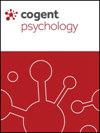头巾和封闭认知:在同质穆斯林占多数的背景下,头巾对人际态度的影响
IF 1.6
Q2 PSYCHOLOGY, MULTIDISCIPLINARY
引用次数: 0
摘要
本文章由计算机程序翻译,如有差异,请以英文原文为准。
Hijab and enclothed cognition: The effect of hijab on interpersonal attitudes in a homogenous Muslim-majority context
Abstract Stereotyping and discrimination against hijab-wearing women have been studied extensively in many Western countries, which are home to Muslim diasporas. However, there is a paucity of research on Muslim-majority countries. The purpose of this study is to address this gap and explore interpersonal attitudes toward both hijab-wearing and non-hijab-wearing women, in Pakistan, a Muslim Majority country. In this paper, we used the presence or absence of hijab as the independent variable, and measured competence and warmth using items from the Stereotype Content Model (SCM), as well as social and task attraction using items from the Interpersonal Attraction Scale (IAS) as dependent variables. Study 1 included 352 undergraduate students, while Study 2 involved 151 human resource professionals. The findings from both studies were consistent in suggesting that participants had a higher attribution of competence, warmth, and social and task attraction toward the hijab-wearing women compared to the non-hijab-wearing women. Conversely, participants in the non-hijab condition attributed lower levels of warmth, competence, and social and task attraction. We interpret these findings such that in a homogeneous society, individuals who strongly identify with and internalize Muslim culture, and exhibit a preference for their own cultural and religious values (cultural endogamy), attribute higher levels of competence, warmth, social attraction, and task attraction to the protagonist who wears hijab. This research has implications for employment opportunities and attitudes toward women in the workplace in Muslim-majority countries, both for hijabis (women who wear a headscarf) and non-hijabis (women who do not wear hijab).
求助全文
通过发布文献求助,成功后即可免费获取论文全文。
去求助
来源期刊

Cogent Psychology
PSYCHOLOGY, MULTIDISCIPLINARY-
CiteScore
2.90
自引率
0.00%
发文量
75
审稿时长
12 weeks
期刊介绍:
One of the largest multidisciplinary open access journals serving the psychology community, Cogent Psychology provides a home for scientifically sound peer-reviewed research. Part of Taylor & Francis / Routledge, the journal provides authors with fast peer review and publication and, through open access publishing, endeavours to help authors share their knowledge with the world. Cogent Psychology particularly encourages interdisciplinary studies and also accepts replication studies and negative results. Cogent Psychology covers a broad range of topics and welcomes submissions in all areas of psychology, ranging from social psychology to neuroscience, and everything in between. Led by Editor-in-Chief Professor Peter Walla of Webster Private University, Austria, and supported by an expert editorial team from institutions across the globe, Cogent Psychology provides our authors with comprehensive and quality peer review. Rather than accepting manuscripts based on their level of importance or impact, editors assess manuscripts objectively, accepting valid, scientific research with sound rigorous methodology. Article-level metrics let the research speak for itself.
 求助内容:
求助内容: 应助结果提醒方式:
应助结果提醒方式:


